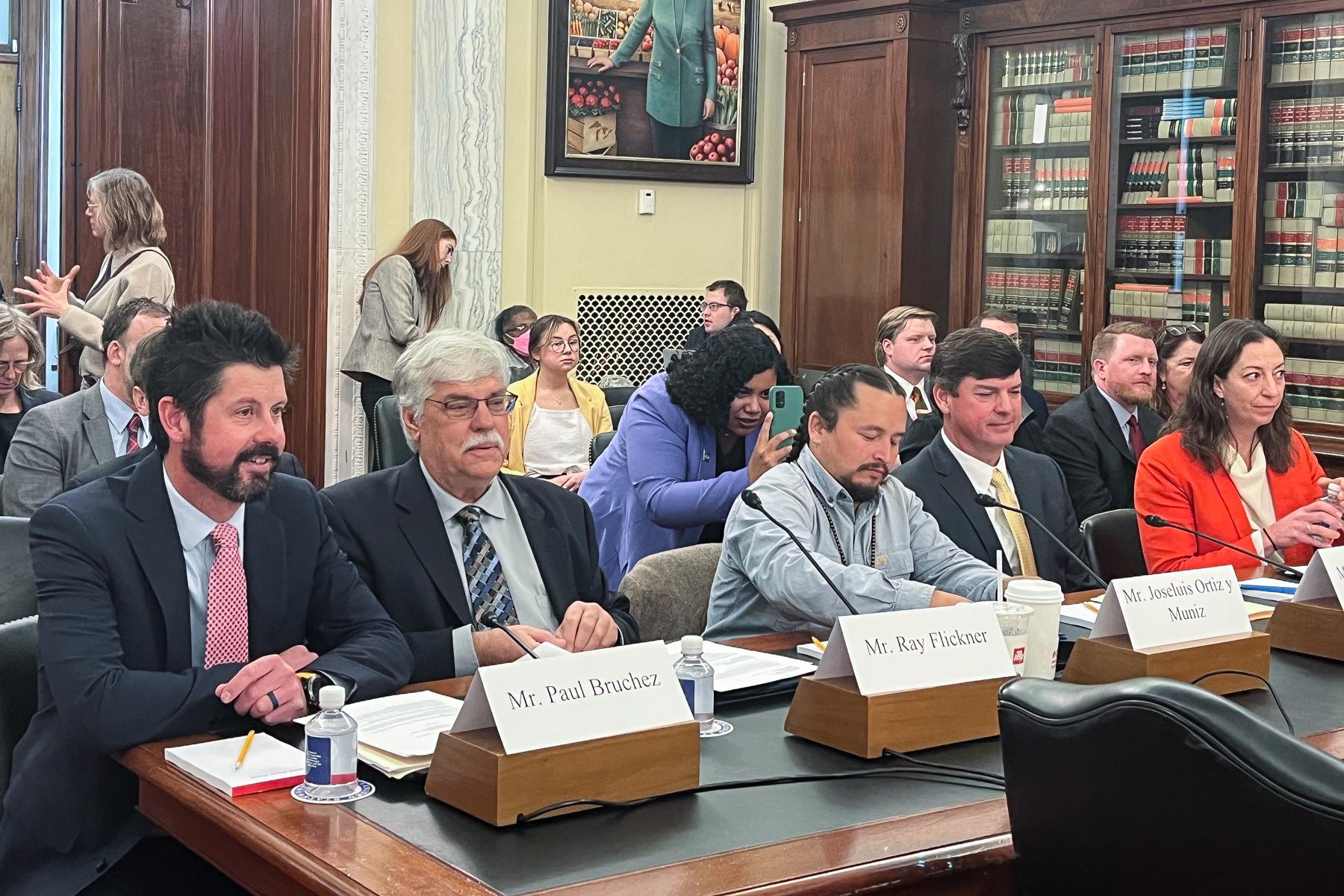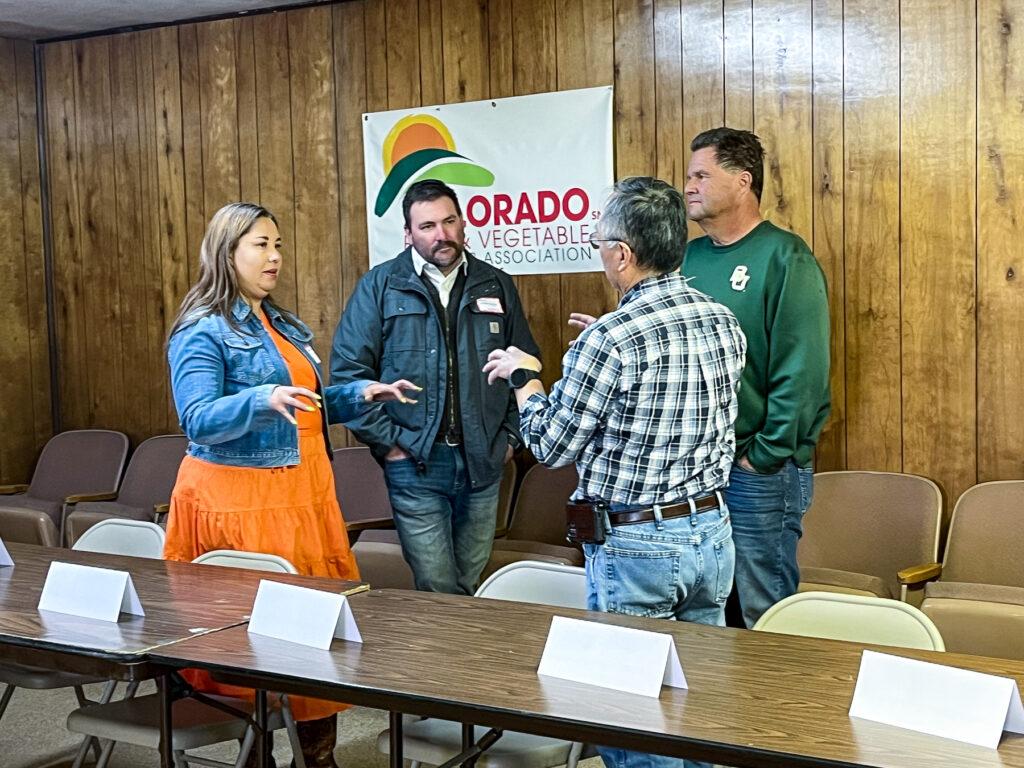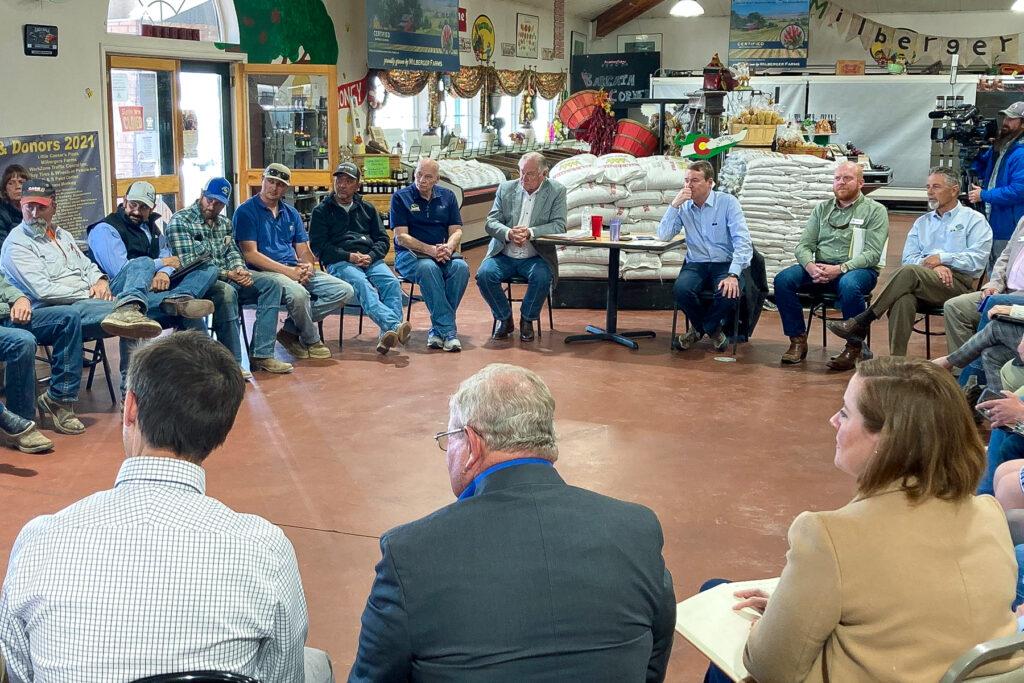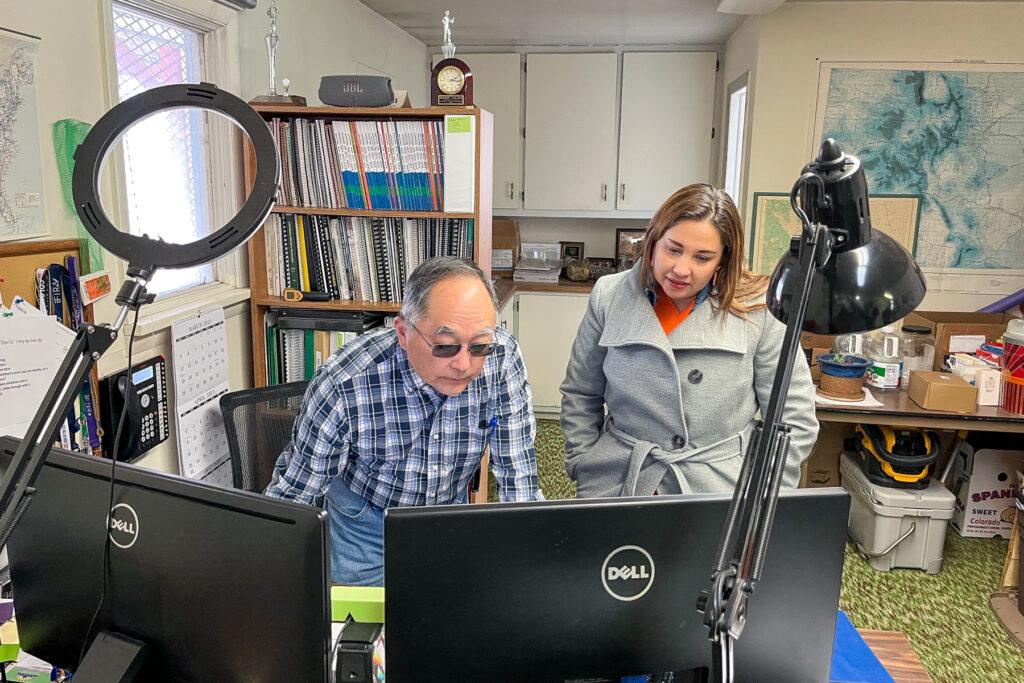
In a wood-paneled conference room at Sakata Farms in Brighton last month, Democratic Rep. Yadira Caraveo faced dairy farmers, ranchers, small specialty crop growers, larger commodity crop farmers and everyone in between.
It was the first term lawmaker’s first listening session for the Farm Bill. As producers told her about the issues that were top of mind for them, Caraveo took notes and asked questions.
Agriculture is big business in Colorado, generating $47 billion annually for the state’s economy and employing more than 195,000 people. And as Congress begins writing the next iteration of the Farm Bill, Colorado lawmakers like Caraveo are doing their best to make the case for the state in this massive piece of legislation.
As a member of the House Agriculture Committee, Caraveo will have a more direct role than most of her colleagues. She said meetings like this are vital as she helps craft the nation’s food policy for the next five years.
“I think it created new priorities for me, and then it also reinforced some of the ones that we were already focusing on,” she said, pointing to issues like the need for estate planning assistance for farmers.

But there was one other message she said that really hit home: “My biggest concern is for the non I-states to continue to be heard, when it comes to Farm Bill priorities,” one participant at the meeting told the congresswoman.
The ‘I-states’ are the midwestern giants like Iowa and Illinois that can dominate national conversations about American agriculture.
“Like that gentleman said at the listening session, a lot of the [Farm Bill] policy is based on the 400 miles around the Mississippi River and not on arid land like we have in Colorado. And that was really important for me to hear,” Caraveo said.
There are a lot of members from the Midwest, the Southeast and California on the House Agriculture committees, but hardly any from the Rocky Mountain West or even the greater Southwest.
Colorado Agriculture Commissioner Kate Greenberg said that means members of Congress can require some extra education when it comes to Colorado-specific issues.
“Not all lawmakers understand the complexity of our environment, our climate, our water situation, certainly our water law,” she explained.
For Democratic Rep. Joe Neguse, who serves in House Democratic leadership, these unique concerns underscore why Colorado lawmakers “want to make sure that Colorado has an outsized influence on [the Farm] Bill.”
Colorado Growers and Congress members support Farm Bill conservation programs
As a member of the Senate Agriculture Committee, Colorado’s senior Sen. Michael Bennet has worked on the last couple of Farm Bills. He’ll tell you it’s not the usual partisan divides that dominate the negotiations over this bill, but regional ones.
For example, while areas in the Southeast can get too much water, Colorado and the West are going through an historic drought.
“It’s been an important obligation of mine, committee hearing after committee hearing after committee hearing, to raise the alarm around that drought,” Bennet said, “And to fight for more robust conservation dollars so that we can respond and our farmers and ranchers and other producers have a fighting chance.”

Bennet chairs Agriculture’s Subcommittee on Conservation, Climate, Forestry, and Natural Resources, where in late April, he convened a hearing on the conservation programs of the Farm Bill.
Among the witnesses who took their seats at the other end of the room, behind a long wooden desk, was Kremmling rancher Paul Bruchez. It was Bruchez’s first time testifying in front of Congress and it was clear he was a bit nervous at first.
Reading from his prepared remarks, Bruchez told the senators about how he and his family utilized a Farm Bill conservation program to deal with the ongoing drought.
“Our ability to irrigate and operate a successful agriculture business was in jeopardy,” he said. “At that time we decided to get involved and make improvements to our ranch to adapt to the changing environment. The Regional Conservation Partnership Program has been instrumental in surviving the last 20 years of ongoing drought.”
As we continue to deal with a changing environment, Bruchez said he wants to make sure these conservation programs continue into the future.
Concerns for Colorado farmers aren't just about managing water, but also managing the land itself. It was less than a century ago that widespread tilling of the central plains led to the Dust Bowl. The disaster devastated eastern Colorado.
The Conservation Reserve Program pays farmers to take their most marginal land out of production (although it can still be used for grazing or hay).

Nathan Weathers of Weathers Family Farms, said CRP is especially important in areas like southeastern Colorado.
“There’s ground there that shouldn’t be farmed and people know it. And they’ve been in such a long drought down there… It’s to the point that ground needs to go back to grass,” he said.
But past Farm Bills have cut the amount of total acreage that can be enrolled in the CRP, and currently the reimbursement rates for Colorado land are much less than other states, say in the Midwest. That gives farmers more incentive to plow up their land, despite the potential long term consequences.
Water and soil conservation programs and incentives are key concerns
Many agriculture producers also spoke about programs like the Environmental Quality Incentives Program (EQIP), which can help improve water usage, or the Conservation Stewardship Program (CSP), which among other things encourages cover crop rotation.
At Caraveo’s Brighton roundtable, producers all spoke highly about the goals of the Farm Bill’s conservation programs and how they want to see more support for them, as well as some fixes.
Vanessa McCracken, district manager at the Boulder Valley and Longmont Conservation Districts, has a map of about $1 million in possible shovel ready EQIP projects they’ve been working on with private landowners.
“We've been working real hard for the past couple years to get these landowners to a place where they're ready,” she said, but they’re waiting for more EQUIP funding. “When it gets there, we will be ready.”
“It's really expensive to do forest restoration and wildfire mitigation work, especially for private landowners who don't have a lot of resources or a lot of time,” McCraken said. “And so that EQIP money is really an essential first piece to getting a lot of these projects completed on the ground.”
Using these conservation and forestry programs also depends on being able to get technical help from knowledgeable staff. And that was Bruchez’s takeaway to senators: you need to staff up the Natural Resources Conservation Service.
“If we’re going to get projects on the ground that are going to have the kind of meaning to withstand adapting to a modern climate, it’s time to gear up.”
The Farm Bill isn’t the only legislation Colorado producers are counting on, though. Many farmers also talked about protecting conservation gains made in the last few years through the bipartisan infrastructure bill or the Democrats’ climate, health and tax bill, known as the Inflation Reduction Act, which is a target for some Republicans.
Bennet said he’s looking forward to making the case for Colorado and the West as negotiations move forward.
“I think we’re going to see a battle in this Farm Bill to make sure that we’re able to hold onto the gains that we’ve already made,” Bennet said. “And that’s a battle I look forward to having, partly because I look forward to convincing people on the (Agriculture) committee that they have a stake in the success of the American West, and that’s really what’s at stake here.”
Farmers in Colorado are depending on their representatives to make that case. As David Harold of Tuxedo Corn Co. in Olathe explained it, it’s hard to both farm and deal with all the politics around farming.
“You can’t be a good farmer and be a good advocate for yourself,” he said. “You hope that they come up with something good.”









